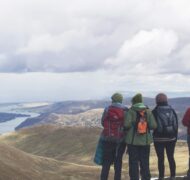Backpacking
Book / Produced by partner of TOW
Backpacking is carrying the necessities of food and shelter from one place to another. In some form this has always been a human necessity: the first men and women had no choice but to carry their few belongings when they traveled. Much that we call progress consists in our development of ways of avoiding such work. Through taming animals (beasts of burden), building boats, inventing the wheel, then (more recently) harnessing the energy of fossil fuels, we have nearly escaped the necessity of carrying our own burdens.
Ironically, it is only as the need for backpacking bas vanished that its attractiveness as a recreation has emerged. As a popular recreation, backpacking is only a few decades old (though the roots of modern backpacking go back as far as nineteenth-century romanticism in both Europe and America).
What is the point of backpacking? Certainly one of the most obvious reasons for the popularity of the activity is that it is the only means of access into the few remaining wilderness areas. The value of wilderness (which, in the words of the U.S. Wilderness Act of 1964, is a region where "man is a visitor and does not remain") has also increased significantly in recent times. Both the popularity of backpacking and the new value placed on wilderness - the places where most North American backpacking takes place - can be traced to a disillusionment with, and a reaction against, the alienating consequences of modern (and increasingly urban) civilization.
From a biblical viewpoint, the appeal of backpacking can easily be understood. We were made for relationship: with creation, with each other and with our Creator. One need only look at rush hour on a modern city highway (with thousands of speeding cars, most carrying one person) to realize how profoundly our preferred modern transportation technology has distanced us from each other and (most obviously) from the sounds, scents and textures of creation. Less obvious, but just as important, is the way in which the ease of modern transportation distances us from our own bodies, which were made to be used (a fact that the proliferation of exercise and fitness centers makes plain).
The overall thrust of modern technology is to make things easy for us, to remove from us the created limitations of space and time. On the most profound level, then, backpacking - and the respectful experience of creation that it enables - is an attempt to recover the fact that we are
creatures and are made for relationship.
Backpacking requires that we strip down what is needed for living to the bare necessities of food, water and shelter. It reminds us that we are finite, limited and that we depend ultimately on God and the Creator's gifts for our life. It also opens for us the inexhaustible sensual richness of the created world. Motorized travel limits our appreciation of creation almost entirely to the visual. But in backpacking all the senses are awakened. Thus it restores our relationship not only with creation but with our physical body.
Some also feel that the solitude and vulnerability that backpacking invites make them more open to the Creator. Indeed, many who have turned their backs on all organized religion find wilderness backpacking an intensely spiritual experience. The importance of wilderness sojourns in the Bible - whether of the lsraelites, David, Elijah or Jesus underlines the spiritual importance of that recovery of the value of solitude, creation and physical work. That value is caught in the significance of words like pilgrim,journey and sojourn, words which are deepened in their meaning by the ancient experience of backpacking.
Modern equipment - formfitting packs, good rain gear, lightweight stoves and waterproof tents - can take some of the hardship and danger out of backpacking. (Though another danger is that the fascination with equipment turns backpacking into another excuse for being a consumer.) Persons - and families - who are new to the activity might be wise to make their first trip with someone who has more experience.
» See also: Camping
» See also: Creation
» See also: Ecology
» See also: Leisure
» See also: Recreation
» See also: Sabbath
» See also: Traveling
References and Resources
S. P. Bratton, Christianity, Wilderness and Wildlife; The Original Desert Solitaire (Scranton, Penn.: University of Scranton Press, 1993); H. Manning, Backpacking: One Step at a Time (New York: Vintage Books, 1986); R. Nash, Wilderness and the American Mind (3rd ed.; New Haven, Conn.: Yale University Press, 1982).
— Loren Wilkinson





